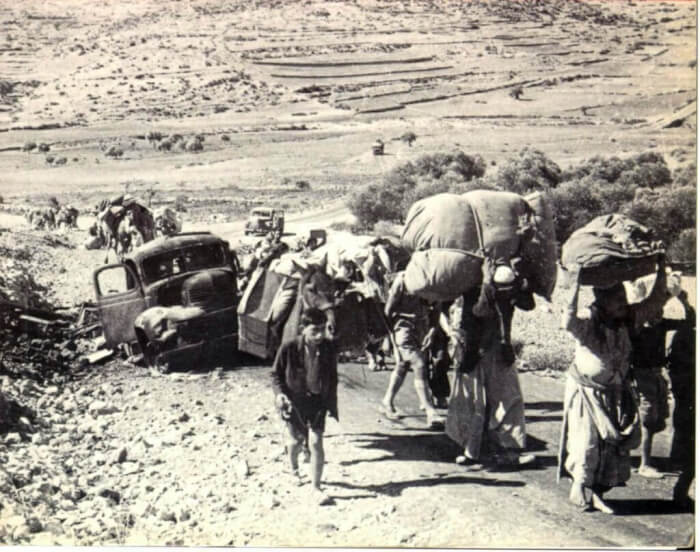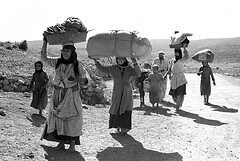Putting Amal before Nakba in next 70 years
Changing the movement after 70 years to liberate Palestine, moving forward beyond the Nakba to Amal, from tragedy to hope. The Palestinians need to reassess their strategies moving forward, silence the fanatics and extremists, and build a new communications network to help the public and world see the truth about the history of Palestine and Israel’s violent and discriminatory policies
By Ray Hanania
I never liked the word “Nakba,” which in English means “catastrophe.” It’s a painful word, one that instead of inspiring hope and strength, feeds anger, emotion and failure.
Successful leaders and communicators will tell you that you don’t build a movement on tragedy. You use tragedy to fuel passion, but you build movements on hope, “Amal.”
The Nakba symbolizes the day on May 14, 1948 when Jewish immigrants fleeing Western anti-Semitism and hate, mostly from Europe, were given the land of Palestine by the West. Palestine was a land occupied mostly by non-Jews who were welcoming to Jews. But those non-Jewish Palestinian Arabs were betrayed and forced to flee.
In Israel today, Christians and Muslims are denied their basic human rights, living in a system relying on 65 laws to justify discrimination based on religious racism.

More than 700,000 Palestinians fled Israel into exile in 1948 in the face of Jewish and Zionist terrorism. Although 150,000 remained behind to be oppressed by Israel, they have grown to nearly 2 million. In 1967, Israel expanded this oppression by occupying Jerusalem, the West Bank and the Gaza Strip and oppressing millions more.
During the past 70 years, Palestinians and Arabs have wallowed in suffering, while Israelis turned to strategic communications, propaganda and fiction to construct a false historical narrative they easily sold to the West. In Many cases, they also sold it to the Arab World.
Israelis and Jews celebrate and rejoice in the reality of Israel, closing their hearts and minds to the suffering their actions have caused, while Palestinians commemorate in the tragedy.
The reality is that 70 years later, Palestinians are disorganized and divided over what path to take. Disorganization has led to anger. And anger has led to failure. Emotion seeks to turn back time to 1948. But we can’t turn back time.
Israel is slowly erasing Palestine, and ironically, Palestinian anger and extremism is acting like a fertilizer to strengthen that Israeli goal.
Israel could not survive if Palestinians and Arabs united. Israel uses our anger and extremism, to distort truth, twist history, and poison the minds of the public in the West. We need that public if we want to restore Palestine.

To do it, we must replace the loathing of Israel with the love for ourselves. In that positive energy, we can rebuild a movement to re-establish Palestine. We must change to win. Instead of commemorating the past, the Nakba, we need to celebrate the future, the Amal.
An important principle of success is that positive energy fuels achievement. We must redefine our movement from the Nakba to the Amal. Palestinians must abandon anger and hatred against Israel, and focus instead on the power of Palestinian and Arab culture.
How do we win?
We must do a better job of telling our story, not through anger but through positive narrative. We must change our focus from telling the story to ourselves, to telling the story to the public. Too much of the public believes Israel’s falsehoods that Palestine never existed, or that Israel is the victim.
Israel is not the victim. Israel’s government is the oppressor.
The Palestinian narrative must change from one of mourning, which celebrates death, to one of empowerment and hope. Palestine is not dead. It is alive. It has never left us. Our narrative must be made easier to understand.
We must present our story in a compelling, non-threatening manner. American lack of understanding is a good example of the challenge. When presented with differing and conflicting narratives, or truths, most Americans will believe the “truth” that sounds the most reasoned and is commonsense.
Until today, Israel has done a better job of presenting their story in a compelling and reasoned manner, while the Palestinian story has been conflicted, angry and sometimes, because of extremism, unreasonable.
We must replace hatred, anger and emotion with hope. When we respond to the haters, we empower their narrative and their standing in the eyes of the public.
Palestinians must set aside differences and come together as a community. We have to end the divisions which create confusion and a “noise” that distorts what the public hears. Palestinians don’t really work well together. We cluster around politics, a reflection of our tribal culture. We use our history in different ways.
Palestinians must become more tolerant of differing voices in our community. There is no single road. There is no one voice to victory. We need all our opinions. We need real Democracy which is built with tolerance, not intolerance.
Individual Palestinian groups with selfish interests and politics have hijacked the Palestinian cause. They exclude Palestinians they disagree with and spend more energy fighting among themselves than fighting the Israelis. All of the Palestinian conferences marking the Nakba embrace a limited range of Palestinian voices, opinions and ideas.
If Palestinians can’t bring our community together, we can’t win the public’s support. No Palestinian should be excluded from the movement to restore Palestine. If we can’t respect ourselves, how can we expect others to respect us?
Palestinians must do a better job of communicating with ourselves as a Palestinian community if we hope to be more effective in communicating and winning over the public. We need to better network. We need to spend more energy helping other Palestinians than engaging in vitriol with Israelis.
Let’s transform the Nakba into the Amal, a movement to bring our community together, to empower our narrative, and to celebrates the beauty of a future where Palestine exists in Statehood.
(Ray Hanania is an award-winning Palestinian American columnist and the author of several books including “Yalla! Fight Back.” His personal website is www.Hanania.com. Twitter: @RayHanania)


- Israelisnipers shooting and killing hospital workers in Gaza - December 11, 2023
- CAIR Condemns Israeli Executions of Wounded, Unarmed Palestinian in West Bank - December 11, 2023
- Arab and Muslim American voters face a “simple choice” between Biden’s inhumanity and Trump’s edgy politics - December 9, 2023






















These are the nations recognizing the US Embassy move to Occupied Jerusalem: oppressive, dictators and corruption nearly everyone. The Arab and Muslim Worlds should target these countries and close relations with them, if they had any honor
Albania, Angola, Austria, Cameroon, Congo, the Democratic Republic of the Congo, Ivory Coast, Czech Republic, Dominican Republic, El Salvador, Ethiopia, Georgia, Guatemala, Honduras, Hungary, Kenya, Macedonia, Burma, Nigeria, Panama, Peru, the Philippines, Romania, Rwanda, Serbia, South Sudan, Thailand, Ukraine, Vietnam, Paraguay, Tanzania and Zambia